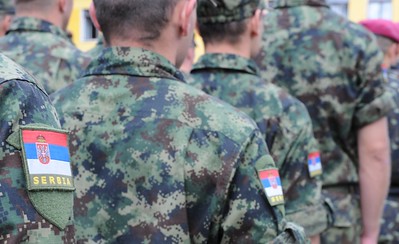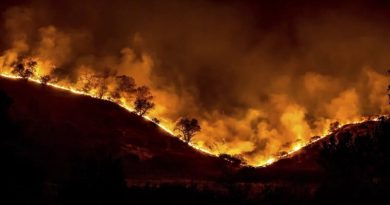FOCUS on Recent Post-Soviet Instability: Serbia and Kosovo
Melissa Myrtaj
Staff Writer
The question of who has the right of self-determination has reached many political leaders in Post-Soviet and Post-Yugoslavian states. The internationally recognized lines that divide countries have grayed in the eyes of many allies of Russian President Vladimir Putin. According to Politico, September 28 saw one of the worst confrontations between Serbia and Kosovo since Kosovo declared independence in 2008.
In the ethnic Serbia-majority region, near Banjska, Reuters reports that four people, including a Kosovo police officer, were killed after masked gunmen arrived in armored vehicles and forced their way into a Serbian Orthodox monastery where priests and pilgrims locked themselves inside the monastery’s temple. The siege went on for hours and ended after the police officer and three of about 30 attackers were killed in shootouts. After the attack, ABC News reports that Kosovo police found large quantities of weapons and equipment owned by the attackers that suggested they had a broader attack planned. U.S. officials also monitored a large deployment of Serbian troops along the border with Kosovo, describing it as an “unprecedented staging of advanced Serbian artillery, tanks and mechanized infantry units,” according to ABC News.
In an interview with The Associated Press, Kosovo’s interior minister, Xhelal Sveçla, alleged that these operations originated in Serbian training camps for Kosovo Serbs who have dual citizenship. Furthermore, Sveçla told The Associated Press, “We found some documents which lead us to a suspicion that there were individuals coming from Russia too. For the equipment, we have evidence, but for the people we still have only suspicion.”
This shooting was larger than a group of Kosovo Serbs operating in Kosovo. With the influence of Serbia, there is suspicion of backing from Russia, Serbia’s ally who also does not recognize Kosovo’s independence. Politico stated that Kosovo’s Prime Minister, Albin Kurti, described this shooting as “organized crime, which is politically, financially and logistically supported from Belgrade, is attacking our state.”
ABC News adds that John Kirby, spokesman for the White House National Security Council, regarded the size of the weapons cache during the attack as threatening the safety of Kosovo officials and international personnel, including NATO troops..” The number of weapons possessed by the insurgents, involvement of NATO troops in the attack, and the buildup of Serbian troops on the border highlights that this up flare is larger than Kosovo Serbs rebelling against a government and are seeking support from external leaders.
Serbian President Aleksandar Vucic and Russian government officials defended the insurgents, categorizing them as treated unfairly by the Kosovo government and international community. Politico adds that President Vucic denied any involvement from Belgrade and defended the gunmen as local Kosovo Serbs who “do not want to suffer under Kurti’s terror anymore.”
More evidence of Russian support is found in Euronews, as the Russian Foreign Ministry said, “There is no doubt the bloodshed is a direct and immediate consequence of the policy of inciting conflict of the so-called Prime Minister Albin Kurti.” Additionally, Putin’s press secretary, Dmitry Peskov, told Russian state media site Ria News that he watched “closely” the “potentially dangerous” situation in Kosovo, stressing that there is a “biased attitude towards the Serbs.”
On the Monday following the shooting, Kosovar leaders declared a day of mourning and described the event as a terrorist attack seeking to destabilize the region. President Vucic spent Monday meeting with Russian Ambassador Aleksandr Botsan-Kharchenko, accusing Prime Minister Kruti of carrying out “brutal ethnic cleansing,” according to in Politico.
This allyship between Russia and Serbia against Kosovo has not helped Serbia’s case to join the European Union. The European Council’s recent annual report on Serbia read, “In the context of Russia’s war of aggression against Ukraine, the Council expects Serbia to show unequivocal commitment to the EU, to stand up for our common principles and values and to communicate objectively on the EU and actively engage in preventing disinformation and foreign information manipulation.” Instead, recent action shows that Serbia’s relationship with Serbia is still very active.
Additionally, the U.S. is concerned with this allyship. Euronews adds that the U.S. sanctioned Aleksandar Vulin, currently head of Serbia’s intelligence agency, for “us[ing] his public positions to support Russia, facilitating Russia’s malign activities that degrade the security and stability of the Western Balkans and providing Russia a platform to further its influence in the region,” the U.S. Treasury Department said in a statement. This is extremely concerning, as this is the first time a Serbian official has been sanctioned while in office since the wars of the 1990s. According to The Telegraph, Russia and Serbia collaborating accomplishes three goals: to distract the West from the conflict in Ukraine; strengthen Moscow’s standing amongst former Soviet states, and give Putin leverage over the West in order to keep regional conflict at bay. As President Putin wages war in Ukraine, many post-Soviet and post-Yugoslavian states have followed his ideology of gaining territory they believe is theirs to claim. Serbia and Russia’s allyship has caused concerning uprise of destabilization in the Balkan region and others alike.
Image courtesy of Flickr



